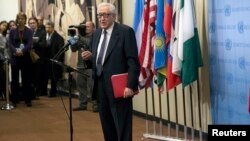UNITED NATIONS —
As the Syrian conflict entered its fourth year this week, international mediator Lakhdar Brahimi warned that if presidential elections go ahead in the coming months, it could jeopardize peace talks between the government and opposition.
Brahimi told reporters after a private meeting with Security Council members Thursday, that while there has been no official announcement in Damascus that the presidential election is on -- it was scheduled to happen by July -- there are a lot of activities indicating it will take place.
“If there is an election, my suspicion is that the opposition - all the opposition - will probably not be interested in talking to the government," he said.
Speaking privately, Western diplomats have shared this concern, saying that if President Bashar al-Assad goes ahead with the vote, which they believe would likely be rigged, and is seen to be headed for a third seven-year term, then there would be no incentive for opposition leaders to return to negotiations.
The peace talks, known in diplomatic shorthand as Geneva 2, ended in late January without progress and with no resumption date.
Diplomats say Brahimi is still awaiting a response from Damascus regarding the agenda for the next round. He has proposed discussing in parallel both terrorism - which Damascus wants to talk about - and a transitional governing body - which the opposition wants to discuss, but the government has so far refused.
All of this means the suffering of the Syrian people is not likely to end soon.
Last month, the U.N. Security Council unanimously demanded that both the government and opposition give unobstructed access to humanitarian workers trying to get aid to the country’s neediest, including 250,000 people who are in besieged areas.
The Council is due to hear from U.N. humanitarian chief Valerie Amos later this month on whether bureaucratic obstacles have been lifted, cross-border aid deliveries have improved, and the indiscriminate use of barrel bombs by government forces has stopped.
U.N. Secretary-General Ban Ki-moon and envoy Brahimi will brief the U.N. General Assembly Friday morning on Syria.
Brahimi told reporters after a private meeting with Security Council members Thursday, that while there has been no official announcement in Damascus that the presidential election is on -- it was scheduled to happen by July -- there are a lot of activities indicating it will take place.
“If there is an election, my suspicion is that the opposition - all the opposition - will probably not be interested in talking to the government," he said.
Speaking privately, Western diplomats have shared this concern, saying that if President Bashar al-Assad goes ahead with the vote, which they believe would likely be rigged, and is seen to be headed for a third seven-year term, then there would be no incentive for opposition leaders to return to negotiations.
The peace talks, known in diplomatic shorthand as Geneva 2, ended in late January without progress and with no resumption date.
Diplomats say Brahimi is still awaiting a response from Damascus regarding the agenda for the next round. He has proposed discussing in parallel both terrorism - which Damascus wants to talk about - and a transitional governing body - which the opposition wants to discuss, but the government has so far refused.
All of this means the suffering of the Syrian people is not likely to end soon.
Last month, the U.N. Security Council unanimously demanded that both the government and opposition give unobstructed access to humanitarian workers trying to get aid to the country’s neediest, including 250,000 people who are in besieged areas.
The Council is due to hear from U.N. humanitarian chief Valerie Amos later this month on whether bureaucratic obstacles have been lifted, cross-border aid deliveries have improved, and the indiscriminate use of barrel bombs by government forces has stopped.
U.N. Secretary-General Ban Ki-moon and envoy Brahimi will brief the U.N. General Assembly Friday morning on Syria.

